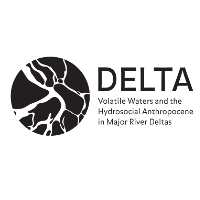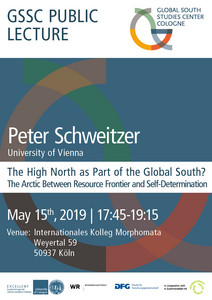Peter Schweitzer from University of Vienna, Austria, will give a presentation as part of the GSSC's public lecture series on May 15th. His talk is entitled:
The High North as Part of the Global South?
The Arctic Between Resource Frontier and Self-Determination
The public lecture will take place at the International Kolleg Morphomata (Weyertal 59, 50937 Köln), from 17.45-19.15.
We are particularly looking forward to this lecture not only because the different local articualtions of the relationship between between state and or private resource extraction pressures and the well-being of individual communities are important topics in the DELTA project, but also because the speaker is one of the project's external partners.
Peter Schweitzer summarizes his presentation as follows:
Today, residents of the High North are citizens of eight so-called “Arctic states”, all of which are relatively affluent on a global scale. At the same time, many indigenous communities in the Arctic and Subarctic live in desperate economic and social circumstances, as a kind of “Third World” within the “First World”, and many of these circumstances are the result of traumatic colonial histories. Still, parts of the circumpolar North have been the stage for relatively successful struggles for economic, social, and cultural rights, while other parts – or, in some cases, the same parts – have attracted growing attention from national and international resource extraction companies. The talk acknowledges the sociopolitical heterogeneity of the North and explores different local and regional articulations of the relationship between state and/or private resource extraction pressures and the well-being of individual communities. The goal is not to provide a firm answer to the title question but to introduce arctic examples of success and failure into global debates.
Peter Schweitzer is Professor and Chair at the Department of Social and Cultural Anthropology of the University of Vienna and Professor Emeritus at the University of Alaska Fairbanks. His theoretical interests range from kinship and identity politics to human-environmental interactions, including the social lives of infrastructure and the community effects of global climate change; his regional focus areas include the circumpolar North and the former Soviet Union.
Schweitzer is past president of the International Arctic Social Sciences Association, and past chair of the Social and Human Sciences Working Group of the International Arctic Science Committee (IASC). He is the editor of Dividends of Kinship (Routledge 2000), as well as co-editor of Hunters and Gatherers in the Modern World (Berghahn 2000), Arctic Social Indicators (Nordic Council of Ministers 2010), and Arctic Social Indicators II: Implementation (Nordic Council of Ministers 2014). Schweitzer is also a co-author of Russian Old-Settlers of Siberia (Novoe izdatel'stvo, 2004; in Russian) and of Arctic Sustainability Research (Routledge, 2017).

